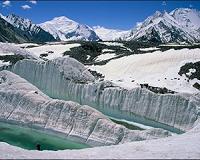| . |  |
. |
Cancun, Mexico (AFP) Dec 9, 2010 The world's climate negotiators on Thursday inched toward compromise on fighting deforestation and assisting poor nations as Bolivia's firebrand leader demanded more aggressive action. With one day left for the UN-led talks in Mexico, South African President Jacob Zuma urged the more than 190 nations to set up "the building blocks" for a comprehensive climate deal when he leads next year's meeting in Durban. "We dare not lose this opportunity," Zuma told reporters at the talks in resort city of Cancun. Australia's Climate Change Minister Greg Combet urged delegates not to get bogged down in process. "It is imperative for the credibility of this process that we are able to make progress here," he said. The negotiations are working on a framework for fighting climate change after 2012, when the requirements for wealthy nations to cut greenhouse gas emissions under the Kyoto Protocol run out. China, while toning down its public statements, opposes a treaty that legally binds it to fight climate change. Japan has led opposition to EU calls to extend the Kyoto Protocol, saying it is unfair as it does not include top polluters China and the United States. In late-night talks, conference watchers said the European Union, Costa Rica and small island states vulnerable to climate change offered a joint compromise under which the Cancun talks would agree to work toward a binding deal but leave discussion of its form -- Kyoto or a new framework -- to Durban. Amid the deadlock on a treaty's form, negotiators reported progress on several other key areas including how to assist poor countries worst hit by climate change and on curbing deforestation, a leading cause of climate change. But Bolivian President Evo Morales, who has emerged as a leading critic of the UN-led talks, demanded more far-reaching action. "If we here throw the Kyoto Protocol into the garbage dump, we would be responsible for economy-cide, for ecocide -- indeed, for genocide -- as we would be harming humanity as a whole," Morales said from the podium of the conference, receiving loud applause. Morales, Bolivia's first indigenous leader, called for an agreement that protects native populations and called for climate assistance to poor countries at a level "equivalent to the budget that developed countries spend on defense, security and warfare." Wealthy economies -- including the European Union, Japan and the United States -- have pledged to help provide 30 billion dollars in near-term assistance to poor nations, along with 100 billion dollars a year in the future. Negotiators said they saw steady progress in setting up the architecture of a future climate fund. A remaining sticking point is whether to include a role for international bodies, such as the World Bank, in administering aid. Jeremy Hobbs, executive director of the anti-poverty movement Oxfam International, praised the proposal under discussion, including its mention of a role in protecting the rights of women. "There is still plenty to improve," Hobbs told reporters. "But at least it was negotiated in good faith and there has been progress." Hobbs hoped that the final proposal would require that 50 percent of aid go toward helping developing nations adapt to climate change. Nations may otherwise be able to meet pledges in other ways such as offering technical know-how on green energy. Another area of progress is on deforestation, with the talks finalizing guidelines on how wealthy nations would assist developing nations in preserving tropical forests -- which play a vital role in the ecosystem by counterbalancing industrial pollution. The Cancun talks have focused on incremental progress, one year after the ambitious Copenhagen summit ended in widespread disappointment. China, which was stung by foreign criticism over its role in Copenhagen, has taken a fresh public approach in Cancun by pledging flexibility. But its stance apparently has limits. Norway, a major player in climate negotiations, said Beijing has refused to negotiate with it in Cancun due to the awarding of the Nobel Peace Prize to jailed Chinese dissident Liu Xiaobo.
Share This Article With Planet Earth
Related Links Climate Science News - Modeling, Mitigation Adaptation
 Himalayan Glaciers Melting At Alarming Rates
Himalayan Glaciers Melting At Alarming RatesCancun, Mexico (SPX) Dec 09, 2010 Concern for high-mountain regions of the world is rising, according to a new report released by the United Nations Environment Programme (UNEP), which states that the Himalayas and many other glaciers are melting quickly, threatening lives by flooding, and by reducing the region's freshwater supply. The findings of the report, "High mountain glaciers and climate change" were announced duri ... read more |
|
| The content herein, unless otherwise known to be public domain, are Copyright 1995-2010 - SpaceDaily. AFP and UPI Wire Stories are copyright Agence France-Presse and United Press International. ESA Portal Reports are copyright European Space Agency. All NASA sourced material is public domain. Additional copyrights may apply in whole or part to other bona fide parties. Advertising does not imply endorsement,agreement or approval of any opinions, statements or information provided by SpaceDaily on any Web page published or hosted by SpaceDaily. Privacy Statement |